Local
March on Washington speakers – gay and straight – call for LGBT equality
Martin Luther King III, NAACP head, U.S. Attorney General mention gays in speeches
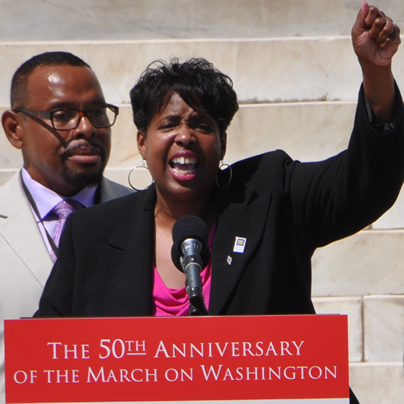
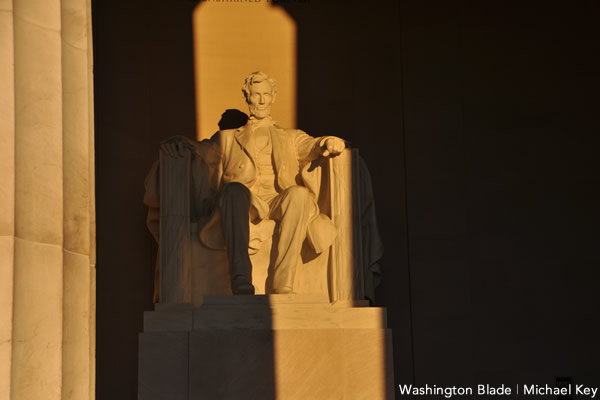
The Lincoln Memorial, site of the 50th Anniversary of the 1963 March on Washington, where Dr. Martin Luther King, Jr. originally gave his famous ‘I Have a Dream’ speech. Five gay and lesbian speakers were among those who took the podium on Saturday. (Washington Blade photo by Michael Key)
At least a dozen civil rights leaders and public officials speaking at the Lincoln Memorial on Saturday to commemorate the 50th anniversary of the 1963 March on Washington joined five gay and lesbian speakers in embracing LGBT equality.
Martin Luther King III, one of the lead organizers of the 50th Anniversary March on Washington; U.S. Attorney General Eric Holder; U.S. House Minority Leader Nancy Pelosi (D-Calif.); NAACP President and CEO Benjamin Jealous; and Leadership Conference on Civil Rights President Wade Henderson were among those expressing the theme that LGBT rights are part of the boarder civil rights movement.
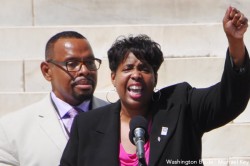
HRC Associate Director of Field Outreach Donna Payne was one of the LGBT speakers at the March on Washington. (Washington Blade photo by Michael Key)
With tens of thousands of people assembled before her on the Lincoln Memorial steps and the National Mall, lesbian activist Donna Payne expanded on that theme.
“In times like this today I stand proudly with you as an African American lesbian representing the Human Rights Campaign,” Payne told the gathering. “I am proud because the lesbian, gay, bisexual, and transgender community and the African American community are working together toward justice for all.”
Payne added, “There have been many attempts to tell you that we can’t get along because we are so different. Don’t believe that hype. I come from a mother and father that sat at the tables at Woolworth stores fighting for freedom from Jim Crow laws.”
Payne, HRC Associate Director of Field Outreach, was referring to black civil rights activists who staged sit-in protests in the early 1960s at segregated restaurants and other businesses in the South that restricted blacks to “colored only” areas.
“The majority in my family are lifetime members of the NAACP,” she said. “This commitment doesn’t stop because I’m a lesbian. I am part of the fabric that weaves our destiny together,” she said. “Freedom is not about one civil rights group but it’s about all of our civil rights for everyone.”
A second rally at the Lincoln Memorial on Wednesday, Aug. 28, in connection with the 50th Anniversary March on Washington events, was scheduled to include speeches by Presidents Barack Obama, Bill Clinton, and Jimmy Carter. Also scheduled to speak was lesbian activist Eliza Byard, executive director of the Gay, Lesbian & Straight Education Network (GLSEN).
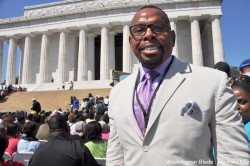
HRC director of Faith Partnership and Mobilization Rev. MacArthur Flournoy (Washington Blade photo by Michael Key)
Rev. MacArthur Flournoy, HRC director of Faith Partnership and Mobilization, told the Lincoln Memorial rally that LGBT people are also part of the faith-based arm of the civil rights movement.
“Today I stand up as a black gay man ordained in the church in love with God filled with faith,” he said. “So we at the Human Rights Campaign – we join our faith with your faith. We look for an end to discrimination in all its forms. No more religious bigotry. No more racist bigotry. No more violence bigotry.”
Sharon Lettman-Hicks, executive director of the National Black Justice Coalition, an LGBT rights organization, and Payne of HRC were added as speakers at Saturday’s Lincoln Memorial event after the initial list of speakers had been released.
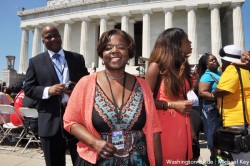
Executive Director of the National Black Justice Coalition Sharon Lettman-Hicks (Washington Blade photo by Michael Key)
“Every day I educate, advocate, and celebrate the contributions of the black lesbian, gay, bisexual, and transgender community because if any of my brothers and sisters are not equal and free none of us are truly equal and free,” said Lettman-Hicks, a straight, longtime advocate for LGBT rights.
Lettman-Hicks was among a number of the rally speakers who talked about Bayard Rustin, a gay man who served as one of the lead organizers of the 1963 March on Washington and one of Martin Luther King Jr.’s top advisors.
“Rustin was a radical visionary, a black gay activist for freedom and justice during a time when the conditions of both of these identities were perilous,” she said. “Rustin was as unapologetically black as he was gay and by his very presence challenged the evils of homophobia and racism throughout his life.”
Adrian Shanker, president of the statewide LGBT rights group Equality Pennsylvania, identified himself as a “gay Pennsylvanian reflecting on the historic march 50 years ago, a march organized by another gay Pennsylvanian named Bayard Rustin.”
Shanker said he was proud to speak at an event with distinguished civil rights leaders “who paved the paths that allow us to stand here today more equal than yesterday, but with so much farther to go before the dream Dr. King shared will be realized.”
He noted that in Pennsylvania LGBT people can still be fired from their jobs because of their sexual orientation or gender identity. In his home state the governor recently signed a voter ID law “intended to suppress our votes,” and LGBT youth face school bullying “every day,” he said.
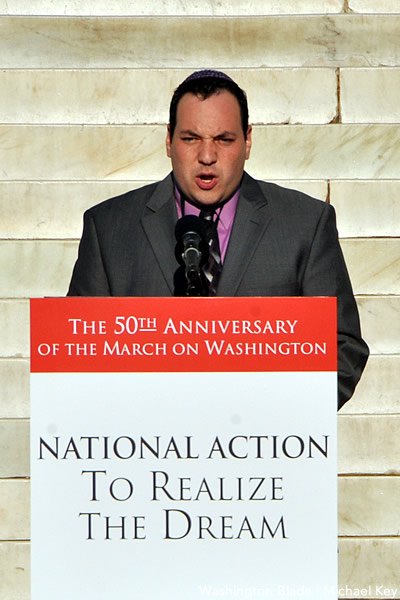
Adrian Shanker, president of Equality Pennsylvania (Washington Blade photo by Michael Key)
“In Pennsylvania my legal marriage to my husband Brandon is not recognized by my government,” said Shanker, who called on states and the U.S. Congress to pass laws to eliminate the remaining discriminatory practices faced by LGBT people across the country.
Two out lesbians and LGBT rights advocates that spoke at the Lincoln Memorial rally – Randi Weingarten, president of the American Federation of Teachers; and Mary Kay Henry, president of the Service Employees International Union (SEIU), stressed the importance of organized labor in the U.S. civil rights movement.
“Dr. King’s oration 50 years ago helped us create a better world, although we do not yet have the world that Dr. King dreamed of,” Weingarten said. “So this must not be a commemoration. This must be a continuation of that righteous fight to achieve racial and economic opportunity at the voting booth, in our schools, in our workplaces and in our communities.”
She added, “Fifty years ago another gay person, Bayard Rustin, had to be in the shadows. But today, I speak as a teacher, a worker, a labor activist and a gay person deeply committed to my faith…This is who we must be, not only a country that believes in equality but a country that acts on that belief. So let’s take a lesson from King. Let’s unite…”
Henry didn’t specifically mention LGBT rights but called for the broad civil rights and economic opportunities that she said were the hallmark of Martin Luther King Jr.’s advocacy work.
“As we rededicate ourselves to the goals of the 1963 marchers imagined 50 years ago we stand for freedom,” she said. We stand for jobs. We stand for equality. And the visionaries of this march proclaimed that we were going to fight the twin evils of racism and economic inequality.”
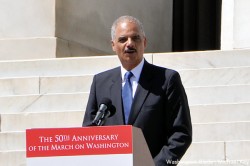
U.S. Attorney General Eric Holder (Washington Blade photo by Michael Key)
Holder, like many of the non-LGBT speakers, noted that LGBT people and other minorities have become a part of the mainline civil rights movement since the time of the 1963 march.
“As we gather today, 50 years later, their march – now our march – goes on,” Holder told the rally at the Lincoln Memorial. “And our focus has broadened to include the cause of women, Latinos, of Asian Americans, of lesbians, of gays, of people with disabilities, and of countless others across the country who still yearn for equality, opportunity, and fair treatment.”
Martin Luther King III said the civil rights movement has become stronger as it has become broader and more diverse, with the diversity reflected in different minorities and different faiths.
“Yes, we all need to love each other, black and white, old and young, red and brown, gay and straight, Christian, Muslim and Jew and all of God’s children loving one another,” he told the rally.
Jealous of the NAACP gave a fiery speech challenging opponents of various civil rights efforts in the country, including opponents of immigration rights and marriage equality.
“When they say no, you can’t have the Dream Act, no you can’t have marriage equality, no you can’t abolish the death penalty, no you can’t expand voting rights in any state south of the Mason-Dixon, we say – yes we can!” shouted Jealous to loud applause and cheers from the crowd.
Newark, N.J., Mayor Cory Booker, who is running for a seat in the U.S. Senate, also sounded the theme of LGBT equality being part of the broader civil rights movement.
“We must stand until we live in a nation where it doesn’t matter who you love and we don’t have second class citizenship for our gay and lesbian brothers and sisters,” he said.
Rep. John Lewis (D-Ga.) was a student in his early 20s when he joined Martin Luther King Jr. and other civil rights icons in non-violent civil disobedience protests in the 1960s. He’s the last living speaker from the 1963 March on Washington.
In his remarks at Saturday’s 50th Anniversary March at the Lincoln Memorial, Lewis expressed support for LGBT equality, just as he has during his years as a congressman.
“It doesn’t matter if we are straight or gay,” he said. “We are all one people.”
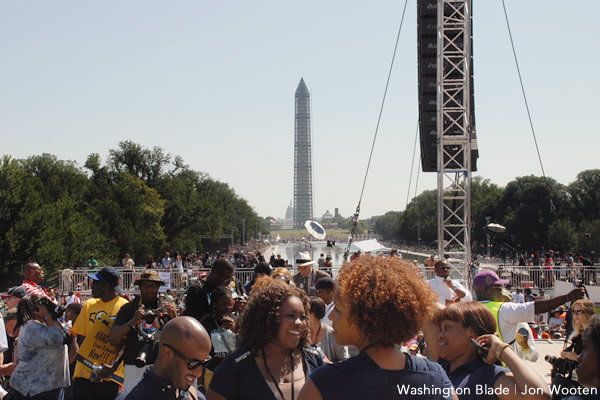
National March on Washington (Washington Blade photo by Jon Wooten)
Virginia
Gay Va. State Sen. Ebbin resigns for role in Spanberger administration
Veteran lawmaker will step down in February

Alexandria Democrat Adam Ebbin, who has served as an openly gay member of the Virginia Legislature since 2004, announced on Jan. 7 that he is resigning from his seat in the State Senate to take a job in the administration of Gov.-Elect Abigail Spanberger.
Since 2012, Ebbin has been a member of the Virginia Senate for the 39th District representing parts of Alexandria, Arlington, and Fairfax counties. He served in the Virginia House of Delegates representing Alexandria from 2004 to 2012, becoming the state’s first out gay lawmaker.
His announcement says he submitted his resignation from his Senate position effective Feb. 18 to join the Spanberger administration as a senior adviser at the Virginia Cannabis Control Authority.
“I’m grateful to have the benefit of Senator Ebbin’s policy expertise continuing to serve the people of Virginia, and I look forward to working with him to prioritize public safety and public health,” Spanberger said in Ebbin’s announcement statement.
She was referring to the lead role Ebbin has played in the Virginia Legislature’s approval in 2020 of legislation decriminalizing marijuana and the subsequent approval in 2021of a bill legalizing recreational use and possession of marijuana for adults 21 years of age and older. But the Virginia Legislature has yet to pass legislation facilitating the retail sale of marijuana for recreational use and limits sales to purchases at licensed medical marijuana dispensaries.
“I share Governor-elect Spanberger’s goal that adults 21 and over who choose to use cannabis, and those who use it for medical treatment, have access to a well-tested, accurately labeled product, free from contamination,” Ebbin said in his statement. “2026 is the year we will move cannabis sales off the street corner and behind the age-verified counter,” he said.
Maryland
Steny Hoyer, the longest-serving House Democrat, to retire from Congress
Md. congressman served for years in party leadership
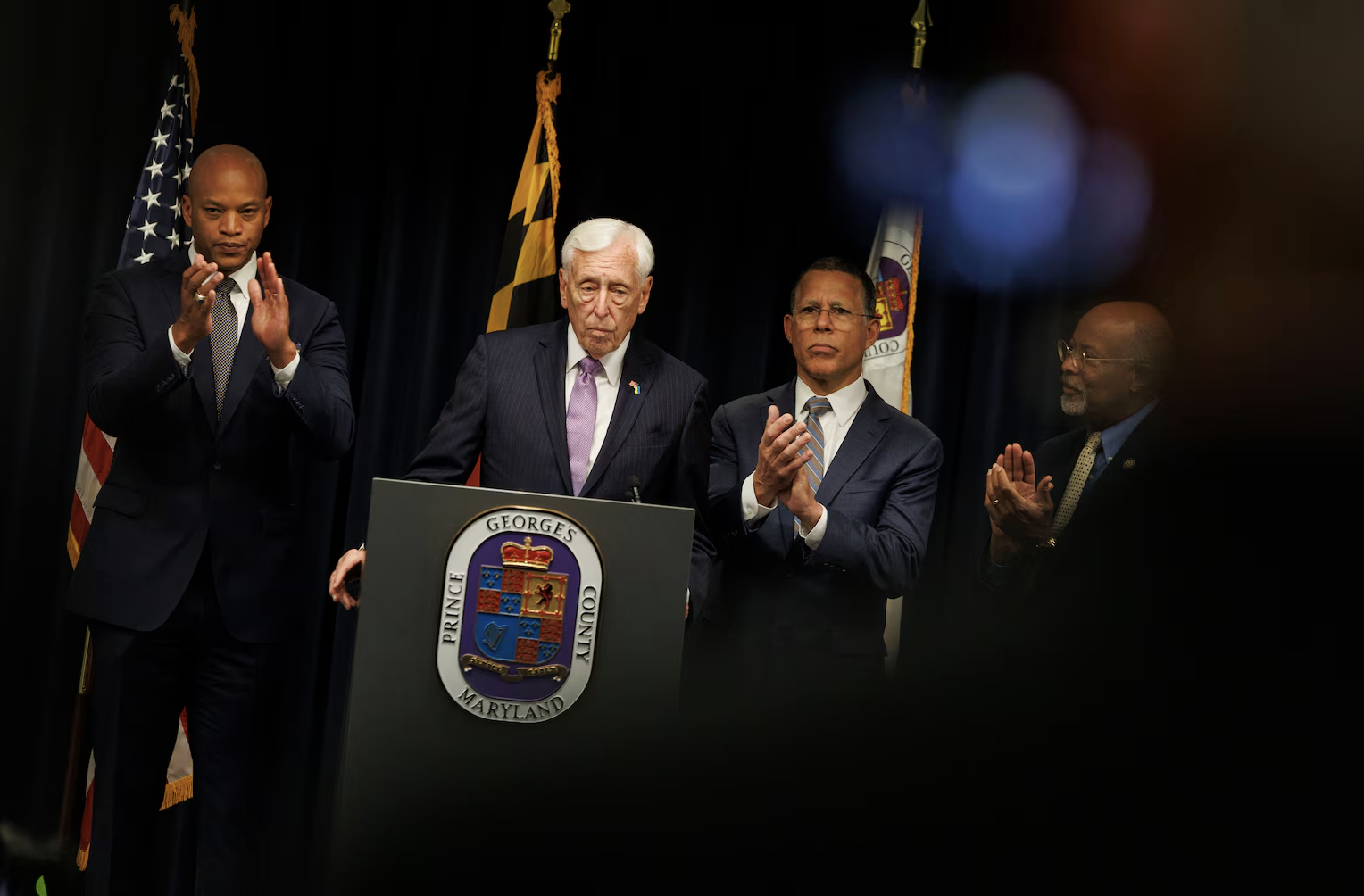
By ASSOCIATED PRESS and LISA MASCARO | Rep. Steny Hoyer of Maryland, the longest-serving Democrat in Congress and once a rival to become House speaker, will announce Thursday he is set to retire at the end of his term.
Hoyer, who served for years in party leadership and helped steer Democrats through some of their most significant legislative victories, is set to deliver a House floor speech about his decision, according to a person familiar with the situation and granted anonymity to discuss it.
“Tune in,” Hoyer said on social media. He confirmed his retirement plans in an interview with the Washington Post.
The rest of this article can be found on the Baltimore Banner’s website.
District of Columbia
Kennedy Center renaming triggers backlash
Artists who cancel shows threatened; calls for funding boycott grow

Efforts to rename the Kennedy Center to add President Trump’s name to the D.C. arts institution continue to spark backlash.
A new petition from Qommittee , a national network of drag artists and allies led by survivors of hate crimes, calls on Kennedy Center donors to suspend funding to the center until “artistic independence is restored, and to redirect support to banned or censored artists.”
“While Trump won’t back down, the donors who contribute nearly $100 million annually to the Kennedy Center can afford to take a stand,” the petition reads. “Money talks. When donors fund censorship, they don’t just harm one institution – they tell marginalized communities their stories don’t deserve to be told.”
The petition can be found here.
Meanwhile, a decision by several prominent musicians and jazz performers to cancel their shows at the recently renamed Trump-Kennedy Center in D.C. planned for Christmas Eve and New Year’s Eve has drawn the ire of the Center’s president, Richard Grenell.
Grenell, a gay supporter of President Donald Trump who served as U.S. ambassador to Germany during Trump’s first term as president, was named Kennedy Center president last year by its board of directors that had been appointed by Trump.
Last month the board voted to change the official name of the center from the John F. Kennedy Memorial Center For The Performing Arts to the Donald J. Trump And The John F. Kennedy Memorial Center For The Performing Arts. The revised name has been installed on the outside wall of the center’s building but is not official because any name change would require congressional action.
According to a report by the New York Times, Grenell informed jazz musician Chuck Redd, who cancelled a 2025 Christmas Eve concert that he has hosted at the Kennedy Center for nearly 20 years in response to the name change, that Grenell planned to arrange for the center to file a lawsuit against him for the cancellation.
“Your decision to withdraw at the last moment — explicitly in response to the Center’s recent renaming, which honors President Trump’s extraordinary efforts to save this national treasure — is classic intolerance and very costly to a non-profit arts institution,” the Times quoted Grenell as saying in a letter to Redd.
“This is your official notice that we will seek $1 million in damages from you for this political stunt,” the Times quoted Grenell’s letter as saying.
A spokesperson for the Trump-Kennedy Center did not immediately respond to an inquiry from the Washington Blade asking if the center still planned to file that lawsuit and whether it planned to file suits against some of the other musicians who recently cancelled their performances following the name change.
In a follow-up story published on Dec. 29, the New York Times reported that a prominent jazz ensemble and a New York dance company had canceled performances scheduled to take place on New Year’s Eve at the Kennedy Center.
The Times reported the jazz ensemble called The Cookers did not give a reason for the cancellation in a statement it released, but its drummer, Billy Hart, told the Times the center’s name change “evidently” played a role in the decision to cancel the performance.
Grenell released a statement on Dec. 29 calling these and other performers who cancelled their shows “far left political activists” who he said had been booked by the Kennedy Center’s previous leadership.
“Boycotting the arts to show you support the arts is a form of derangement syndrome,” the Times quoted him as saying in his statement.
-

 Colombia5 days ago
Colombia5 days agoGay Venezuelan man who fled to Colombia uncertain about homeland’s future
-

 Arts & Entertainment5 days ago
Arts & Entertainment5 days ago2026 Most Eligible LGBTQ Singles nominations
-

 District of Columbia5 days ago
District of Columbia5 days agoKennedy Center renaming triggers backlash
-

 District of Columbia5 days ago
District of Columbia5 days agoNew interim D.C. police chief played lead role in security for WorldPride




















